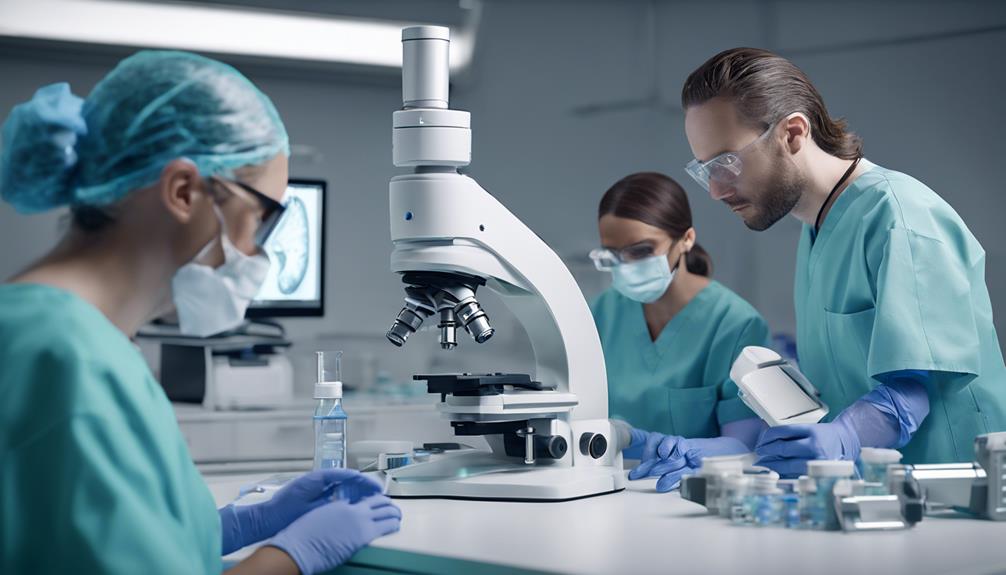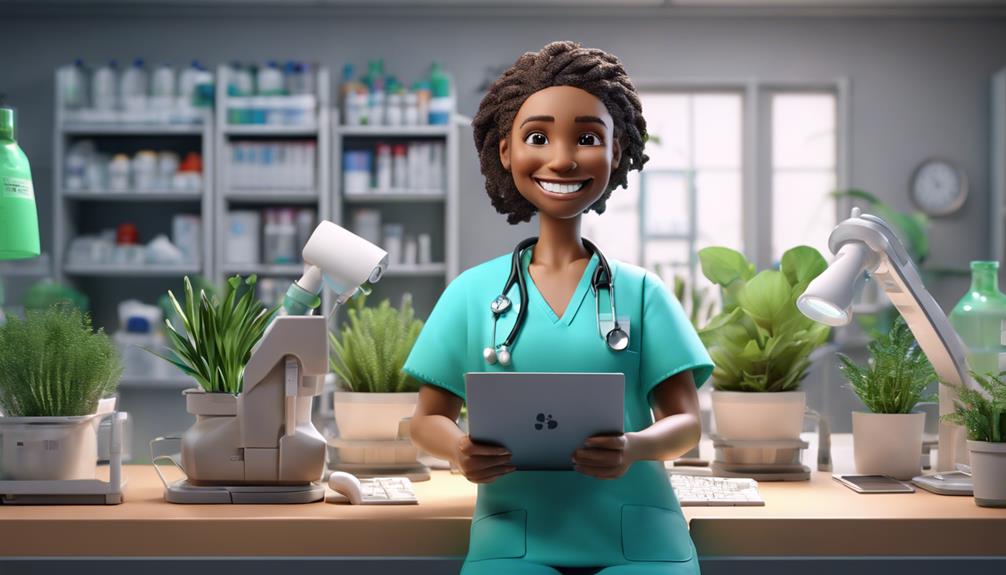
If you're seeking an entry into the medical tech field with minimal barriers, consider becoming a pharmacy technician. This role is typically less demanding because it requires just a certificate program for entry, rather than advanced degrees. Your main duties would involve assisting pharmacists with dispensing medications, managing prescriptions, and interacting with customers, which means less direct stress compared to other medical tech positions that handle critical patient care. Plus, the work environment often offers more predictable hours, providing a better balance between professional and personal life. Understanding the specifics of this role could set you on a promising career path with substantial benefits.
Understanding Medical Tech Roles

Exploring the variety of roles in medical technology helps you identify the easiest entry points into the field. You'll find that the sector is vast, encompassing everything from equipment maintenance to sophisticated diagnostic analysis. Understanding these roles can pinpoint where you might fit best without needing extensive specialization right away.
Firstly, consider the role of a medical equipment technician. You're responsible for installing, maintaining, and repairing medical devices. It's a hands-on job that requires a technical skill set, but doesn't typically demand advanced medical knowledge, making it more accessible for beginners.
Another entry-level position is that of a medical laboratory technician. Here, you'll handle and analyze biological samples under the guidance of more experienced technologists. This role offers a blend of technical and scientific work, providing a thorough introduction to the medical tech field without overwhelming you.
Additionally, health information technicians manage patient data and health information systems. This role prioritizes organizational and data management skills over direct patient care or complex laboratory work, which might appeal to you if you're more inclined towards administrative tasks.
Criteria for Evaluating Ease
To determine the easiest medical tech job for you, consider several key factors such as required education, day-to-day responsibilities, and personal aptitude. You've got to think about what suits you best. Are you keen on direct patient interaction, or do you prefer a behind-the-scenes role? Each position will have a different impact on your daily routine and stress levels.
You'll also want to weigh the physical demands of the job. Some roles might require you to be on your feet most of the day, involved in patient lifting and moving, while others might involve more desk-based tasks. It's crucial to assess your physical capabilities and comfort level with these demands.
Another aspect to consider is your interest in ongoing learning and adaptability to change. Medical technology is continuously evolving, so you'll need to stay updated with the latest advancements and possibly further your education down the line. Are you up for that challenge?
Lastly, think about the work environment. Do you thrive in fast-paced settings like hospitals, or would a calm clinic be more your speed? Understanding these elements will help you pinpoint the job that feels the least burdensome to you.
Training Requirements Overview

Now, let's look at the training requirements you'll need to meet for different medical tech jobs. Depending on the role you're eyeing, you might be in for a varied length and type of educational and training pathway.
Typically, positions like a pharmacy technician or a phlebotomist require you to complete a certificate program, which can take anywhere from a few months to a year. These programs are often available at community colleges or technical schools.
For some tech roles, such as a radiologic technician, you'll need to pursue an Associate's degree, which typically spans about two years. This is more intensive than a certificate and includes both classroom learning and hands-on training through clinical rotations.
Don't forget, you'll also likely need to pass a certification exam after your studies. For instance, becoming a certified phlebotomy technician requires passing an exam from an accredited body like the National Healthcareer Association.
Moreover, some states have specific licensing requirements, even for entry-level positions. It's essential you check the regulations in the state where you plan to work, as these can significantly affect your path to starting your career.
Job Responsibilities Explained
Understanding your job responsibilities is crucial to excelling in any medical tech role. As you step into one of these positions, you'll find that your tasks vary depending on the specific job you've landed. However, you can expect some common duties across most roles.
You'll be handling sophisticated equipment, so you'll need to operate, maintain, and sometimes repair this machinery. This involves following strict protocols to ensure everything functions correctly and safely.
You're also likely to prepare and organize patient records, ensuring that data is accurate and accessible for other healthcare professionals. Moreover, you'll assist in performing diagnostic tests and managing the technology that supports them.
This means you'll not only run the tests but also help in interpreting the results, under the supervision of specialized medical staff. You'll need to be meticulous in both the execution and documentation phases to support effective patient care. Communication is another key responsibility.
You'll interact with a team of healthcare providers, sharing information that's critical to patient treatment plans. Being clear and effective in your communication ensures that the team functions well and that patient care is seamless and efficient. Each responsibility you manage directly impacts patient care, highlighting the importance of your role within the healthcare team.
Stress Levels in Medical Tech

Working in medical tech often involves high stress levels due to the critical nature of the job and the need for precision in every task. You're constantly aware that a small error could have significant consequences, not just for your career but, more importantly, for a patient's health. This pressure can be relentless and is compounded by the fast-paced environment typical of many healthcare settings.
You'll find that stress in medical tech isn't just about the tasks you perform but also stems from long hours and the emotional toll of dealing with patients in critical conditions. The need to stay updated with the latest technological advancements and continuously adapt to new protocols adds another layer of stress.
Despite these challenges, you can manage stress effectively with the right strategies. Prioritizing self-care, such as getting enough rest, maintaining a healthy diet, and exercising, can mitigate some of the physical stressors.
Seeking support from colleagues, participating in stress-reduction programs offered by many employers, and possibly consulting with a mental health professional can also help you cope better. Remember, recognizing when you're overwhelmed is key to seeking the support you need to maintain both your well-being and your professional performance.
Top Easiest Medical Tech Jobs
Exploring the realm of medical tech, you'll find some roles are notably less stressful and easier to manage than others.
One of the most approachable positions is that of a Medical Records Technician. You'll be responsible for organizing and maintaining data in electronic health records systems. It doesn't require direct patient care, which can reduce stress significantly.
Another relatively easy entry point is the role of a Pharmacy Technician. While you'll assist pharmacists with dispensing medications, the job often follows a consistent routine and the work environment is usually structured, which might make it easier for you to adapt and excel.
Diagnostic Medical Sonographers also have a comparatively straightforward role, focusing on operating imaging equipment to help doctors diagnose and treat patients. The technical aspect of the job is manageable once you're trained, and the physical demands aren't as high as in other tech roles.
Lastly, consider the position of a Dental Lab Technician. You'll work behind the scenes designing and fabricating dental prosthetics. It's meticulous work, but it's less directly involved with patients and doesn't typically face the pressures of emergency medical situations.
These roles offer a gentler introduction to the healthcare industry, often with less pressure than other tech positions.
Advantages of Simple Tech Roles

Considering simpler tech roles in medicine can offer you significant benefits, including reduced stress and more manageable workloads. When you're not overwhelmed, you tend to enjoy your work more, leading to better job satisfaction. Often, these roles have clearer tasks and fewer emergencies, allowing you to maintain a better work-life balance. You'll likely find yourself leaving work at work, giving you more time for personal activities and less worrying about job pressures at home.
Moreover, simpler tech positions can be less physically demanding. You mightn't be required to perform the strenuous activities that some higher-level medical positions demand. This can be especially advantageous if you're looking for longevity in your career without the wear and tear on your body. Additionally, these roles often come with structured schedules, and unexpected overtime is rare, making it easier to plan your life without constant interruptions.
This streamlined workload not only benefits your personal life but can also contribute to your professional development. With more predictable hours, you can allocate time for further education or skills training, enhancing your career prospects without sacrificing your current job stability.
Getting Started in Medical Tech
To get started in a medical tech role, you'll first need to identify the specific position that aligns with your interests and skills. Explore the various roles available, such as a phlebotomist, EKG technician, or lab assistant, and consider what suits you best. Each role requires different levels of training and certification, so it's crucial to understand the prerequisites.
Once you've chosen a path, you'll need to pursue the necessary education. This might involve completing a certificate program, which can typically be done at community colleges or vocational schools. These programs often last from a few months to a year and include both classroom learning and hands-on training.
After finishing your educational requirements, obtaining certification is your next step. Certification, which is often essential for employment, validates your skills and knowledge in the field. Check which certifications are recognized in your state and by potential employers.
Frequently Asked Questions
How Do Medical Tech Jobs Impact Patient Care Directly?
Medical tech jobs directly enhance patient care by improving diagnostic accuracy and treatment efficiency. You'll see techs operating advanced equipment, conducting tests, and ensuring all data is precise for better healthcare outcomes.
What Are Common Misconceptions About Medical Tech Roles?
You might think medical tech roles are just about running machines, but they're crucial in diagnosis and treatment, requiring deep knowledge and precision, not just technical skills. Misunderstandings often undervalue their complexity.
Can Introverts Thrive in Medical Tech Jobs?
Yes, you can thrive as an introvert in medical tech jobs. Many roles require focus and precision over constant social interaction, making it ideal for someone who prefers more solitary work environments.
How Does Technology Advancement Affect Medical Tech Job Stability?
Technological advancements generally enhance job stability in medical tech by creating demand for new skills and roles. You'll need to adapt and learn continuously to stay relevant and secure in your career.
What Are Typical Career Paths After Starting in Medical Tech?
You'll find many career paths after starting in medical tech. You can advance to more specialized tech roles, management positions, or even cross over into related fields like biomedical engineering or healthcare IT.
Conclusion
You're now equipped to dive into the medical tech field, understanding the roles that align with your goals.
Remember, the easiest job often combines minimal training with manageable stress. Explore roles like medical records technician or pharmacy tech to start smoothly.
Embrace these simpler positions to kickstart your career while gaining valuable experience. Don't hesitate; begin your journey in medical tech today and make a significant impact with less pressure.
Your path awaits!






